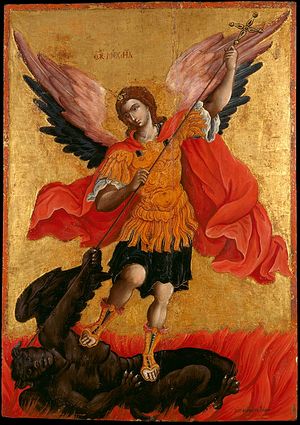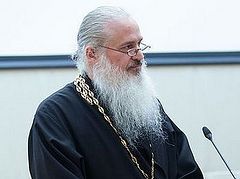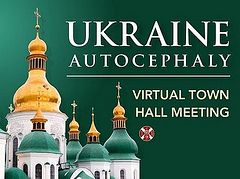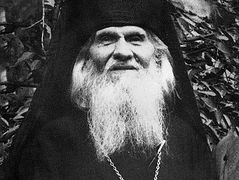by This morning's reading, which after morning prayers, is, as always, varied and across a spectrum of religious and political writings. Preoccupying my mind of late has been the state of Orthodoxy Christianity, its fracture and future. We can easily delve into the minutiae and determine who has said or done what against whom. We may do this to the point of distraction, missing those directly before us who require help. We may also do the opposite, as I was, and focus solely on those directly before us missing the spiritual event horizon that will result in a change in our eternal destiny.
 In other words, to focus on a single spectrum of religious and political writings to discern truth is a mistake. God speaks to us in varied ways. And we ought to, being open to God, recognize what is before us. That which is present may have nothing to do on the specific topic of concern in our mind, but it is still able to touch us by analogy. This morning I was reading an article on migration and open borders by Matthew Schmitz[1] wherein he states the following.
In other words, to focus on a single spectrum of religious and political writings to discern truth is a mistake. God speaks to us in varied ways. And we ought to, being open to God, recognize what is before us. That which is present may have nothing to do on the specific topic of concern in our mind, but it is still able to touch us by analogy. This morning I was reading an article on migration and open borders by Matthew Schmitz[1] wherein he states the following.
In the run-up to World War II, men inside and outside the Church invoked the gospel to justify appeasement and pacifism. After his own flirtation with the idea, Reinhold Niebuhr came to believe that pacifism was ‘unable to distinguish between the peace of capitulation to tyranny and the peace of the Kingdom of God.’ In the name of an abstract ‘law of love,’ pacifists abandoned their duties to God and man. They refused to recognize that a fallen world can never be free of conflict. This was bad politics—and bad religion.
Albeit the article was not about Ukraine, the paragraph is, by analogy, relevant to the conflict present within its borders. Its existence is the result of “bad politics” leading to “bad religion.” Moreover, certainly, given the last paragraph of the so-called-Tomos issued by the Ecumenical Patriarchate, signed by the Ecumenical Patriarch (EP), the call for pacifism (or non-violence) is in actuality a historic failure “to distinguish between the peace of capitulation to tyranny and the peace of the Kingdom of God.” It is the “abandonment [of] duties to God and man.”
The present conflict, initiated by the EP and wholly unsupported by the Orthodox world's leadership (the thirteen local churches), was ignited “in 1992, [by] the Metropolitan of Kiev, Philaret (Denisenko), having earlier lost his bid to become Patriarch of Moscow, proclaimed himself Patriarch of Kiev and set up his own Ukrainian Orthodox Church, known as the UOC-KP, or simply Kievan Patriarchate.”[2] We are where we are today in the Orthodox world, not just in Ukraine, because of man's pride exercised 27 years ago.
The process accelerated in “the wave of nationalism inspired by the 2014 Maidan Revolution and the war with Russia, [when] draft law 4128”[3] was introduced. The law among other things gives the state complete control over the church in Ukraine.
An article, which stands on its own, worth reading in toto is The Gospel According to Poroshenko: Politics, Religion, and the New Church of Ukraine[4] by Nicolai N. Petro. But it merits adding that the “Wunderwaffe[5] or “silver bullet” promulgated and fired by Kiev and the EP is deeply flawed.
Autocephaly cannot be granted to a country. It can only be granted to a canonical Orthodox Church, and all Orthodox churches, including the Patriarchate of Constantinople, were in agreement that the UOC-MP was that church. Finally, the UOC-MP itself had not asked for autocephaly, and emphatically rejected the intercession of the Ecumenical Patriarch.[6]
Returning to the article by Matthew Schmitz, he later states,
It is impossible to understand the Western response to migration without understanding its basis in a certain form of liberal Christianity: a Christianity that reduces the gospel to an abstract law of love, ignoring much of Scripture—and reality.
I would restate the above by only changing a few words, “It is impossible to understand the Western response to [the intercession of the Ecumenical Patriarch] without understanding its basis in a certain form of liberal Christianity: a Christianity that reduces the gospel to an abstract law of love, ignoring much of Scripture—and [God's] reality.” Indeed, ignoring Tradition and canon law.
What must be recognized is that while “man” and his pride and ego are involved in the recent 2018 and 2019 actions, recall they began in 1992, if not earlier. Read another way; the devil has been patiently posturing himself for today's conflict.
While not stating the preceding, Nicolai Petro's article, in its conclusion offers hope and does refer to the devil.
Politicians typically overlook this aspect of the Church’s strategy for dealing with the secular world because they fail to appreciate that the Orthodox Church sees itself, first and foremost, as a supernatural actor, a tangible manifestation of the work of the Holy Spirit. The modern view, that man is a political animal (ζῷον πoλιτικόν) whose actions ought to be evaluated through the prism of relations between the individual and the state, strikes most Orthodox social theorists as extremely narrow. In any political discourse, they say, some part of the universal and ultimate truth always gets lost. Orthodoxy, therefore, has no set preference for one form of politics over another, because that which is needful, right, and proper, simply lies beyond the ken of politics.
From an Orthodox religious perspective, therefore, fleeting political passions matter very little. The Orthodox liturgy, after all, begins with the admonition of Psalm 146:3, “Put not your trust in princes, in sons of men in whom there is no salvation.” Of far greater importance is the struggle for the soul of mankind, which is the Church’s raison d’etre. As Orthodox Christians see it, therefore, the Church can always rely on one insurmountable advantage in any conflict with political actors—its timeframe for success is eternity. One should, therefore, expect it to bide its time in its dealings with its opponents, confident in the promise that was once made to it, that even “the gates of Hell shall not prevail against it” (Matthew 16:18).
So what is the lesson learned for Orthodoxy Christians? We either play the short game, the one wherein pride, ego, and politics prevail in creating a “certain form of liberal Christianity: a Christianity that reduces the gospel to an abstract law of love, ignoring much of Scripture—and [God's] reality.” Alternatively, we can play the long game, the one which our Lord God and Savior Jesus Christ gave us—the Church—“confident in the promise that was once made to it, that even “the gates of Hell shall not prevail against it” (Matthew 16:18).”
I have opted for the latter. I have lost all of this life that is fleeting, excepting family and those spiritually and intellectually astute enough to comprehend the truth.
I recognize the conflict—the cosmic battle—is more significant than this life. I chose the truth, hope, and the Church. Having done so, I recognize that I still have much work to do. Moreover, I know I still require God's mercy. However, when I fall asleep, which is inevitable, I pray it will be as a priest participating in God's priesthood, in good standing, and in a canonical Church.
Life is about the long game—eternity—because we will never die. At the moment we leave this earthly life, the devil, as it is presently, will be present in our future attempting to claim our souls.
Lastly, Schmitz includes in his article,
Obedience is never so simple as renouncing violence (as does the EP) or refusing to defend national boundaries. In an imperfect world, peace must be protected by strength of arms, and welcoming the stranger entails preserving the society that might welcome him.
In the context of this article, preserving the society, means preserving God's Church, the peace of the Kingdom of God.




